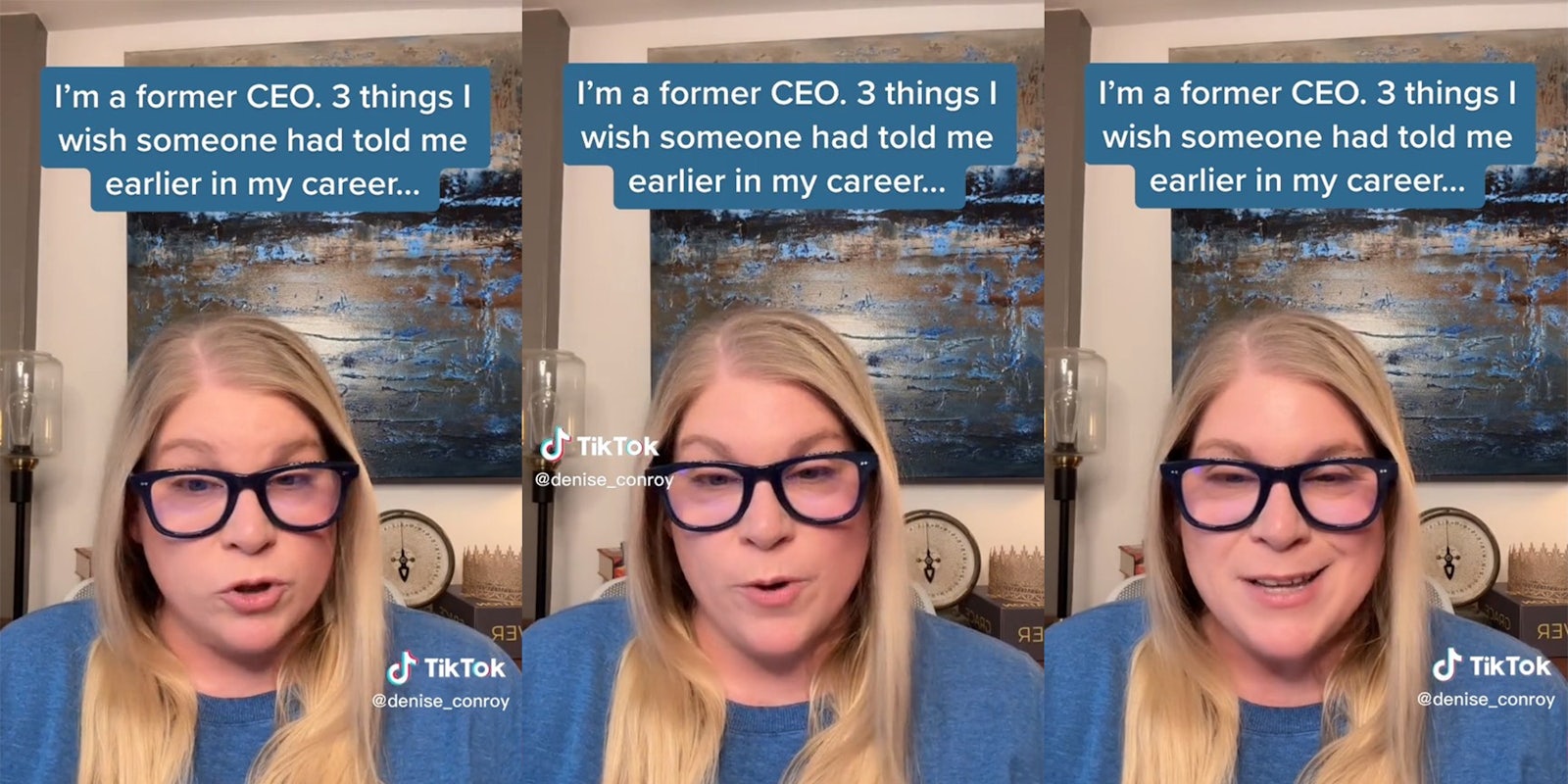A former CEO has taken to TikTok to dispense some advice about jumping jobs that has resonated with a great number of people on the platform—as she’s encouraged people to “jump to your heart’s content.”
Now a performance coach, Denise Conroy (@denise_conroy), whose website notes that her coaching is geared to “grooming founders and executives to be purpose-driven and human-centered,” posted the TikTok video on Dec. 16. It stands out in engagement from other similarly-formatted videos on her channel, attracting more than 2.4 million views and more than 251,000 likes.
In the clip, she speaks about the three things she wishes someone had told her earlier in her career. As her caption summarizes, those three things are “jump jobs, save loyalty for personal relationships, [and] people leave bad bosses rather than jobs.”
@denise_conroy Jump jobs, save loyalty for personal relationships, people leave bad bosses rather than jobs. #ceomindset #queenmaker #csuite #leadership #leadershipdevelopment #careertiktok #careeradvice #executive #coach #executivecoaching #careertok ♬ original sound – Denise Conroy
On the first point about jumping jobs, she observes, “Jumping jobs gets a really, really bad rap. And I have learned over my 30-year career, jumping jobs is rational. It’s sane, it’s how you make moves, bold moves in your career, to make more money. It’s how you get promoted. You shore up your skill set … jump until your heart’s content.”
The second point began, “You don’t owe your company loyalty.” However, Conroy clarifies, “You owe your company respect, the services that you promise that you will provide in the course of your job and all those duties. You owe them great performance, you owe them great attendance, but you do not owe them loyalty. Let’s save loyalty for our personal relationships.”
The third one asserted that when people leave jobs, they’re actually leaving bosses whose leadership they question. “The first type of boss is a toxic boss,” she noted, explaining that this is “a bad boss, somebody who harasses you, micromanages you, maybe ignores you, gives you the silent treatment.”
She then continued, “The second type of boss, though, that people leave more often than not is a boss that fails to see you. That’s a boss who doesn’t give you credit, doesn’t think about your growth, doesn’t think about your development, doesn’t come through with the raise or promotion that they promised over and over again.”
She concludes, “Those bosses get left all the time. Don’t be one of those types of bosses.”
Though the message seemed targeted to bosses looking to be better, the advice about jumping jobs in particular resonated with a great number of employees contemplating hopping workplaces in the comments.
“Been thinking of jumping,” one commenter shared. “I have only been there for 7 months but there are people there with 8-10 years and [the] same title.”
Conroy responded to that comment by encouraging, “JUMP!” before adding, “People are jumping even more frequently since the pandemic.”
Another noted, taking Conroy’s lesson about loyalty to heart, “I built myself up at a company for about 9 years and in the end it didn’t matter to them. I thought I’d have friends when I left, that wasn’t true either. Most are more loyal to the company.”
Conroy, harkening back to a story she shared on her website, commented, “Sounds like the story of my time at HGTV. Some people can only be friends with you through work. It hurts, and it’s a useful lesson.”
“My family always throws comments at me like ‘you’ve had a lot of jobs’ like it’s a bad thing,” another commenter reflected. “Uhm, no it led me to where I am now and I’m soooo happy!”
Conroy responded, “My family did that to me too. Expected me to work at the same place for 30 yrs. No thanks!”
One person challenged Conroy, arguing, “You say you don’t owe them loyalty, then proceed to list attributes (eg great attendance, respect) that demonstrate a level of loyalty,” punctuating it with a monocle emoji.
But Conroy countered with an observation that those attributes actually “demonstrate accountability,” labeling that a “different concept.”
In a phone interview on Sunday, Conroy said that she opened a TikTok account as another avenue for reaching people, but has only been actively creating content for about a month, and was surprised by her first viral success—though she did provide insights on why she thinks this one took off.
“I think that folks are looking for someone, especially somebody who has been either in the C suite or in a CEO role, and someone that looks like them — 51% of the population in the U.S. is female, yet I believe right now in the S&P 500, something like 32, or 6% of CEOs, are female. So I think number one, it definitely resonated with women, as most of my posts do. And I think the other thing is, is that people, people get gaslit at work every day. So I think they want to know that there’s actually someone who’s been in a position of power, who’s sane and rational, and who sees them. I really think that’s the key to it.”
She did note that some users who appeared to be men, based on their avatars, questioned where she was a CEO and commented disparagingly on her appearance. Despite being surprised by those kinds of responses, she said there were other more positive surprises in her interactions with users.
“I was stunned at how many people don’t feel seen in the workplace,” she observed. “I do think that seeing your employees is probably one of the most important things, being able to look at a person, see what they’re going through, and obviously adjust, help, support. I think that’s really critical.”
She added, based on the number of views she got and the number of comments she saw to that effect, “We have a lot of work to do to make people feel safe.”



